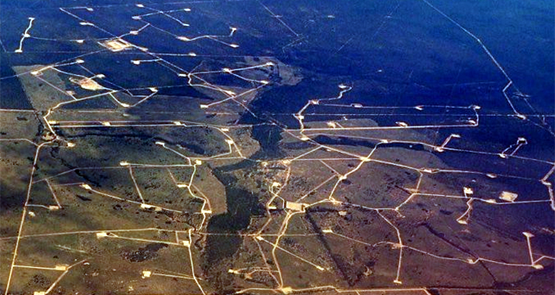In case you missed it, on his way out the door last week, AGL chief Michael Fraser casually observed that there was enough gas in Bass Strait to head off any supply shortages in New South Wales.
That is a stunning admission from one of the key instigators of a massive scare campaign designed to pressure the NSW government into fast-tracking approvals for AGL’s controversial coal seam gas projects in Gloucester and Santos’ Narrabri project in the Pilliga State Forest.
The scare campaign was always based on a false premise that NSW, which has always depended on gas from interstate — whether from Victoria’s Bass Strait or South Australia’s Moomba or Queensland’s coal seam gas fields — suddenly needed its own gas supply.
As Crikey reported in this three-part series last year, Australian Energy Market Operator modelling showed the only place where there was going to be a potential shortage of gas on the east coast was at Gladstone, where a cocky gas industry has over-reached by building three massive, liquefied natural plants, which will triple demand for coal seam gas on the eastern seaboard.
What’s more, everyone in the gas industry knew there was plenty of gas in Bass Strait that could be affordably piped up to NSW with a bit of infrastructure upgrading (which has been done).
In what we would call commendable honesty — but what the industry‘s spin meisters would no doubt regard as an unhelpful departure from the script — then-BHP Billiton petroleum chief Mike Yeager told a press conference at Australian Petroleum Production and Exploration Association’s (APPEA) 2012 conference in Adelaide that gas from the company’s joint venture with major oil player Exxon in Bass Strait could supply east coast markets “indefinitely”.
He would know. So would the head of Australia’s largest gas pipeline operator, the APA Group, Mick McCormack, who told the ABC’s The Business program last September: “We don’t see a crisis happening vis a vis NSW running out of gas … Over the last 10 months, we’ve announced four contracts, three of which are about expanding the current pipeline we own between Victoria and NSW … that is the market at work.”
All that didn’t stop AGL touting forecasts, as recently as a month ago — in evidence to a state parliamentary inquiry, no less — that NSW would face 21 days without enough gas from winter 2016.
Wittingly or unwittingly, politicians at a state and federal level (not to mention certain willing dupes in the media) have been sucked into the scare campaign, right up to Industry Minister Ian Macfarlane, who has used the looming shortage argument to put maximum pressure on the NSW government to approve CSG projects.
It was always rubbish, part of a chess game played by Santos and AGL, trying to ratchet up domestic gas prices, and the game is still going on, even as oil prices have crashed.
On Thursday, beleaguered Santos took a massive $808 million before-tax write-down against its Narrabri project, effectively admitting there was no value in the CSG fields bought for $924 million in the disastrous 2011 acquisition of Eastern Star Gas. Such a write-down has been looming for years — analysts started writing it off ages ago — and it is worthless blather from Santos chief David Knox, when he told The Australian: “This is a highly strategic asset, because NSW is going to be short of gas. Nobody should doubt our resolve to bring this to market.”
The truth is almost exactly the opposite: nobody in the industry believes the Narrabri project will be developed this decade. The CSG industry was established with oil at $100 a barrel, and Santos is cutting costs drastically. Economically recoverable reserves with oil at $50 a barrel are much smaller and reserves are being written down everywhere. Narrabri is stranded. AGL, already suspended from drilling at Gloucester after BTEX turned up in one of its wells, and facing trenchant opposition from farmers, is sure to follow suit … just as it did with the northern expansion of its Camden gas project, written off in 2012.
They wonder why we’re cynical. APPEA complains constantly about misinformation spread by the likes of the anti-coal seam gas campaigners Lock the Gate, an alliance of farmers and greenies. If they could get laws restricting the ability of community campaigners to criticise controversial projects — as Tasmania’s forestry industry just tried to do — and thereby restrict your freedom of speech, rest assured they would do it.
Meanwhile, here is APPEA spending millions on a misinformation campaign to dream up a NSW gas-supply crisis that doesn’t exist. Someone should lose their job over it, but they won’t. The consequence for industry when it tells lies? None whatsoever.









No more drilling and mining? Quick, tell the Libs to reinstate support for manufacturing, education, innovation and all the other things we dropped to support drilling and mining.
The people of Victoria were persuaded to go gas years ago, now we’re being told our gas, which was always for Australian domestic consumption, is going to be exported overseas, so there’ll be a shortage. Actually, the cost of electricity vs gas is now pretty much even for domestic use. The issue is mostly for industry dependent on gas.
Btw, whenever the West Australians and Queenslanders whinge about Victoria living off their mineral deposits, they forget that, for many years, most of Australia’s oil and gas came from this state.
It was Kloppers that I first heard state that there was enough gas in Bass & NW shelf to supply east coast indefinitely. Wasn’t that a few years ago???
APPEA and cohort are guilty of a massive terminological inexactitude (they lied!!). Now is the time to take the politicians to task because they parroted the APPEA line to the detriment of hundred of decent people (whose lives the gas industry ruined). Shame on the “nationals” who trod all over their natural constituency (farmers) to put their snouts in the coal scuttle/trough.
We need to vote in the people who will draw this sad (coal based) episode to an end. Maybe then that nice Mr Baird, our premier, will not have to act as a FlyInFlyOut coal hole opening operative for his next trip to Maules Creek!!! Taking a helicopter to avoid his electorate, indeed!!